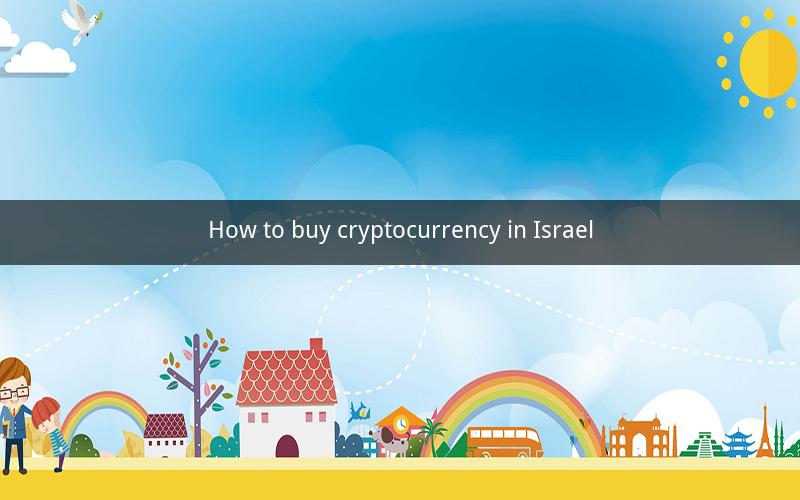
Directory
1. Introduction to Cryptocurrency in Israel
2. Legal Framework for Cryptocurrency in Israel
3. Types of Cryptocurrencies Available
4. Choosing a Cryptocurrency Exchange in Israel
5. Understanding Security Measures
6. Verifying Your Identity
7. Depositing Funds
8. Buying Cryptocurrency
9. Storing Cryptocurrency
10. Tax Implications
11. Conclusion
1. Introduction to Cryptocurrency in Israel
Cryptocurrency has gained significant traction worldwide, and Israel is no exception. With a tech-savvy population and a growing interest in digital currencies, the Israeli market has seen a surge in cryptocurrency adoption. This guide will provide a comprehensive overview of how to buy cryptocurrency in Israel, covering legal aspects, security measures, and practical steps.
2. Legal Framework for Cryptocurrency in Israel
The Israeli government has taken a cautious approach to cryptocurrency regulation. While there is no specific legislation for cryptocurrencies, the Israel Tax Authority has issued guidelines on taxing cryptocurrency transactions. It is crucial to understand these regulations to avoid legal implications.
3. Types of Cryptocurrencies Available
Several cryptocurrencies are available in Israel, including Bitcoin, Ethereum, Litecoin, and Ripple. Each has its unique features and market value. Researching these options will help you determine which cryptocurrency aligns with your investment goals.
4. Choosing a Cryptocurrency Exchange in Israel
Selecting a reliable cryptocurrency exchange is essential for a smooth buying experience. Consider factors such as fees, security, user interface, and available cryptocurrencies. Some popular exchanges in Israel include eToro, Coinbase, and Bit2C.
5. Understanding Security Measures
Security is a top priority when dealing with cryptocurrencies. Exchanges and wallets use various security measures, such as two-factor authentication (2FA), cold storage, and encryption. Familiarize yourself with these features to protect your investments.
6. Verifying Your Identity
Most exchanges require identity verification to comply with anti-money laundering (AML) and know your customer (KYC) regulations. This process may involve providing personal documents, such as a passport or ID card, and proof of address.
7. Depositing Funds
After verifying your identity, you can deposit funds into your exchange account. Most exchanges accept fiat currencies, such as the Israeli Shekel (ILS), through bank transfers or credit/debit cards. Some exchanges also offer cryptocurrency deposits.
8. Buying Cryptocurrency
Once you have funds in your account, you can start buying cryptocurrency. Choose the desired cryptocurrency and specify the amount you wish to purchase. The exchange will execute the transaction and credit the cryptocurrency to your account.
9. Storing Cryptocurrency
Storing your cryptocurrency securely is crucial to prevent theft or loss. You can choose between a hot wallet (connected to the internet) and a cold wallet (offline). Cold wallets, such as hardware wallets, are considered more secure but can be more expensive.
10. Tax Implications
Cryptocurrency transactions in Israel are subject to tax. The Israel Tax Authority considers cryptocurrency as an asset and requires you to report gains or losses on your tax return. Stay informed about tax regulations to avoid penalties.
11. Conclusion
Buying cryptocurrency in Israel involves understanding the legal framework, choosing a reliable exchange, and taking security measures. By following these steps, you can navigate the Israeli cryptocurrency market with confidence.
---
Questions and Answers
1. Q: Can I buy cryptocurrency in Israel with cash?
A: Yes, some exchanges in Israel accept cash deposits, but this may vary depending on the platform.
2. Q: Are there any restrictions on the amount of cryptocurrency I can buy in Israel?
A: There are no specific limits on the amount of cryptocurrency you can buy, but exchanges may have their own limits based on your account status.
3. Q: Do I need to pay taxes on cryptocurrency profits in Israel?
A: Yes, you are required to report gains or losses from cryptocurrency transactions on your Israeli tax return.
4. Q: Can I trade cryptocurrencies on a regular stock exchange in Israel?
A: No, cryptocurrencies are not traded on traditional stock exchanges in Israel. They are exclusively available on cryptocurrency exchanges.
5. Q: What should I do if I lose my cryptocurrency private key?
A: If you lose your private key, you will lose access to your cryptocurrency. Ensure you have backups and take precautions to prevent key loss.
6. Q: Are there any legal risks associated with owning cryptocurrencies in Israel?
A: While there are no specific laws criminalizing cryptocurrency ownership, it is essential to comply with tax regulations and other legal requirements.
7. Q: Can I withdraw my cryptocurrency to any wallet?
A: Yes, you can withdraw your cryptocurrency to any wallet that supports the specific cryptocurrency you hold.
8. Q: Are there any mobile apps available for buying and selling cryptocurrencies in Israel?
A: Yes, there are several mobile apps available, such as eToro, Coinbase, and Bit2C, that allow you to buy and sell cryptocurrencies on the go.
9. Q: Can I use a credit card to buy cryptocurrency in Israel?
A: Some exchanges in Israel accept credit card deposits, but fees may be higher compared to other payment methods.
10. Q: How can I stay informed about the latest cryptocurrency news and trends in Israel?
A: Follow reputable cryptocurrency news websites, join online forums, and follow industry influencers on social media to stay updated.